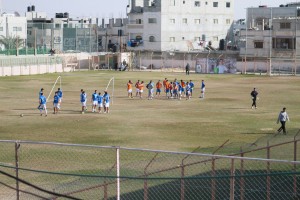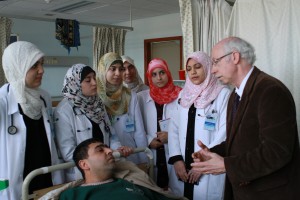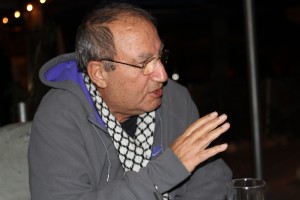Washington doctors get briefing on Gaza water crisis as surgeries continue
(This is Part 5 in a series. For the next several days, Gerri Haynes, a former president of Washington Physicians for Social Responsibility, will be sending back reports from inside blockaded Gaza. As she did twice before, Gerri has organized a team of doctors and other health care providers to work in hospitals and clinics in Gaza in an effort to directly help the people there and to bring attention to the ongoing humanitarian crisis that the Israeli blockade has created.)
Leaders of the Coastal Municipality Authority (responsible for monitoring the water supply and planning for improving the water in Gaza) gave members of our group sobering information about their water supply. Five years from now, they said, there will be not one drop of fresh water naturally available in all of Gaza.
Pollution by over-pumping the aquifers, deep contamination by pollutants (nitrates, chlorides and other toxic substances), incursion of the sea into the fresh water supply – are all creating a critical problem for Gaza. The presence of inadequate sewage treatment means that raw or mostly untreated sewage runs openly across areas of land – polluting the land and fresh water and then polluting the sea as it exits the land.Restoration of the natural aquifer near the Eastern border with Israel is prevented by the heavy clay of the soil – preventing percolation and replenishment of rain water (also in short supply) – and by the wells dug by Israel near the Israeli side of the border – removing water that might flow into the Gaza aquifer.
One new sewage treatment plant will be functional in the near future, but this will not address the magnitude of the need. Other plants are planned, but the presence of the siege and lack of access to materials has prevented construction of these plants. Additionally, the population of Gaza is forecast to double by 2020, creating an unsustainable picture.
Desalination plants are needed – again the siege and lack of access to construction sites and materials make these plants unobtainable.
Gaza is living in a water crisis.
Our group met yesterday with Dr. Eyad Sarraj, founder of the Gaza Community Mental Health Programme. Dr. Sarraj is scheduled to travel next week to Sweden to receive the Olof Palme Prize for his “self-sacrificing and indefatigable struggle for common sense, reconciliation, and peace.” Members of WPSR first met Dr. Sarraj in Gaza in 1993 and he has been an inspiration for any work we have done in this area.Members of our delegation also met last evening with Aidan O’Reilly, deputy director of UNRWA, to learn about the work of the United Nations in Gaza. UN schools serve 213,000 children in Gaza.
The facilities available to serve these children are vastly overcrowded – all children double or triple shift in the schools. Israel has promised that building materials for only 9% of the needed materials for school construction will be allowed to enter Gaza. However, due to the siege, only half of the 9% have been received.
Gaza has an unemployment rate of approximately 66%. Prohibition of construction materials, prohibition of export of agricultural and manufactured goods and prohibition of access to deep water fishing all are part of the ongoing unemployment crisis here.

A youth sports clinic provides organized physical activities for thousands of young people in the southern part of Gaza. (Bob Haynes photo)
This gentleman is also on the board of a youth sports clinic which provides organized physical activities for thousands of young people in the southern part of Gaza.
While the pediatric urology team continues to operate into the night, other members of our delegation are working in areas of Gaza that are new to us. Bob Haynes and I spent yesterday morning at the European Hospital near Khan Younis – Bob in the cardiology section and I with the oncology team.
In Gaza, families live together in geographically close groups and when a family member becomes ill, the family is already present for support. The oncology head nurse, whose husband died recently from cancer, explained to me the Islamic belief that all life and death comes from Allah – and said that she regarded her husband’s death as the will of Allah. This belief, and the natural family presence, she noted, would make much of the hospice work we do in the U.S. unnecessary here.
RSS feed for comments on this post. TrackBack URI

